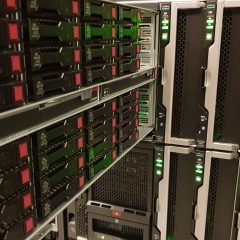HPe Synergy 12000 MPIO QSFP to 10GB SFP Setup
KB ID 0001495 Problem I was recently involved in deploying an HPe Synergy 12000 Frame. And the network connections from it were ‘a little unusual’ so I thought I’d document that here, to save anyone else the problems I had. I was connecting to an HP/Aruba 5412 switch so my cables were all HP/Aruba (to be on the safe side). What you can see (above) is the MPIO Cable (K2Q46A P/N 800867-001) fixed onto the left (and...

